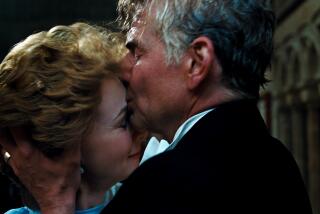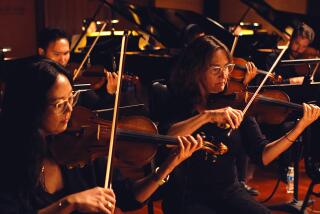The maestro’s legacy reverberates in Nashville : Leonard Bernstein’s dream of creating a center that integrates the arts and the classroom is in full swing.
- Share via
NASHVILLE — On the face of it, this might seem an unlikely place for Leonard Bernstein, the late composer and conductor, to have wanted to build an international arts education center.
Far from New York, where Bernstein lived and made his reputation as conductor of the New York Philharmonic in the 1950s and 1960s--far, in fact, from any of America’s major recognized art centers--Nashville is known first and foremost as the home base of the country music industry.
And, despite Bernstein’s well-known experiments with jazz and popular music forms, country and Western was an idiom with which he never was publicly associated.
Nevertheless, before his death in 1990, Bernstein had begun talks with Nashville art community leaders that would lead in 1992 to the formation here of the Leonard Bernstein Center for Education Through the Arts.
“There is a broad consensus that the present educational system is not working,” said Scott T. Massey, the center’s president. The center is dedicated to finding new ways to motivate students to learn, he said.
The center, which had its celebrity-studded inaugural gala in April, is experimenting with ways to integrate the arts and the classroom, to find ways to use dance, music and painting to teach math, history and science.
Over the next three years, the center plans to develop a national teaching center where instructors will be taught how to infuse arts into the teaching of other subjects.
The center also will, over the same time period, begin implementing its programs in schools, first in Nashville, then in other communities.
At the same time, the center will attempt to establish a research center staffed with distinguished scholars to study the learning process and how the arts might best be used to facilitate learning.
Alexander Bernstein, the son of the late composer and now head of the Bernstein Education Through the Arts Fund, called this research the most important aspect of the center’s work.
“There haven’t been a lot of hard-number studies done,” he said, “but it’s very hard to find anyone to disagree with the notion that the arts are crucial to learning.”
While a number of studies suggest that infusing art in a traditional classroom structure results in higher standardized test scores, more research is needed, Massey said. “We don’t feel we have the final answer,” he said.
The center plans to go beyond traditional approaches to using art in the classroom.
For example, students might learn math by using it to compose their own musical works or might explore African history by writing a drama about it. Next year, students in one Nashville elementary classroom will be taught an entire curriculum through Bernstein’s “West Side Story,” using its themes and music to study, for example, issues of immigration and racial tension in American society.
Although the original plan had been to fully develop the program here before exporting it to other parts of the country, five Southern California educators took part in seminars held in Nashville in June.
“It’s a wonderful approach,” said James Forward, the assistant conductor of the chamber orchestra at the Crossroads School, a private school in Santa Monica. “It gives teachers aesthetic experiences, not only activities to do but also aesthetic appreciation that flows over into other corners of the curriculum.”
Forward and Ilizabeth Kramer, a music teacher and flutist in Santa Monica, plan to begin talking to school administrators in both the Santa Monica and Los Angeles Unified School Districts about starting sister programs.
Why did Bernstein choose Nashville?
Long interested in arts education, he had wanted to find a way to use the arts to stimulate a love of learning in children. In 1988, when he learned that the now-13-year-old Nashville Institute for the Arts had done work along similar lines, he decided to talk with Massey, its president.
Alexander Bernstein said the Lincoln Center in New York also had a similar program, but his father was impressed with Massey’s vision for the center.
Another consideration probably was Nashville’s smaller size and relative lack of big-city bureaucracy, Alexander Bernstein said.
Leonard Bernstein died before plans for the center could be completed. His estate took over preparations.
The Bernstein family and estate has donated $150,000 to the center and given it permission to use tapes of Leonard Bernstein’s “Young People’s Concerts” in the program.
The center is seeking to raise $3 million, primarily from individuals, corporations and foundations in Nashville and Tennessee to establish the program.
More to Read
The biggest entertainment stories
Get our big stories about Hollywood, film, television, music, arts, culture and more right in your inbox as soon as they publish.
You may occasionally receive promotional content from the Los Angeles Times.










